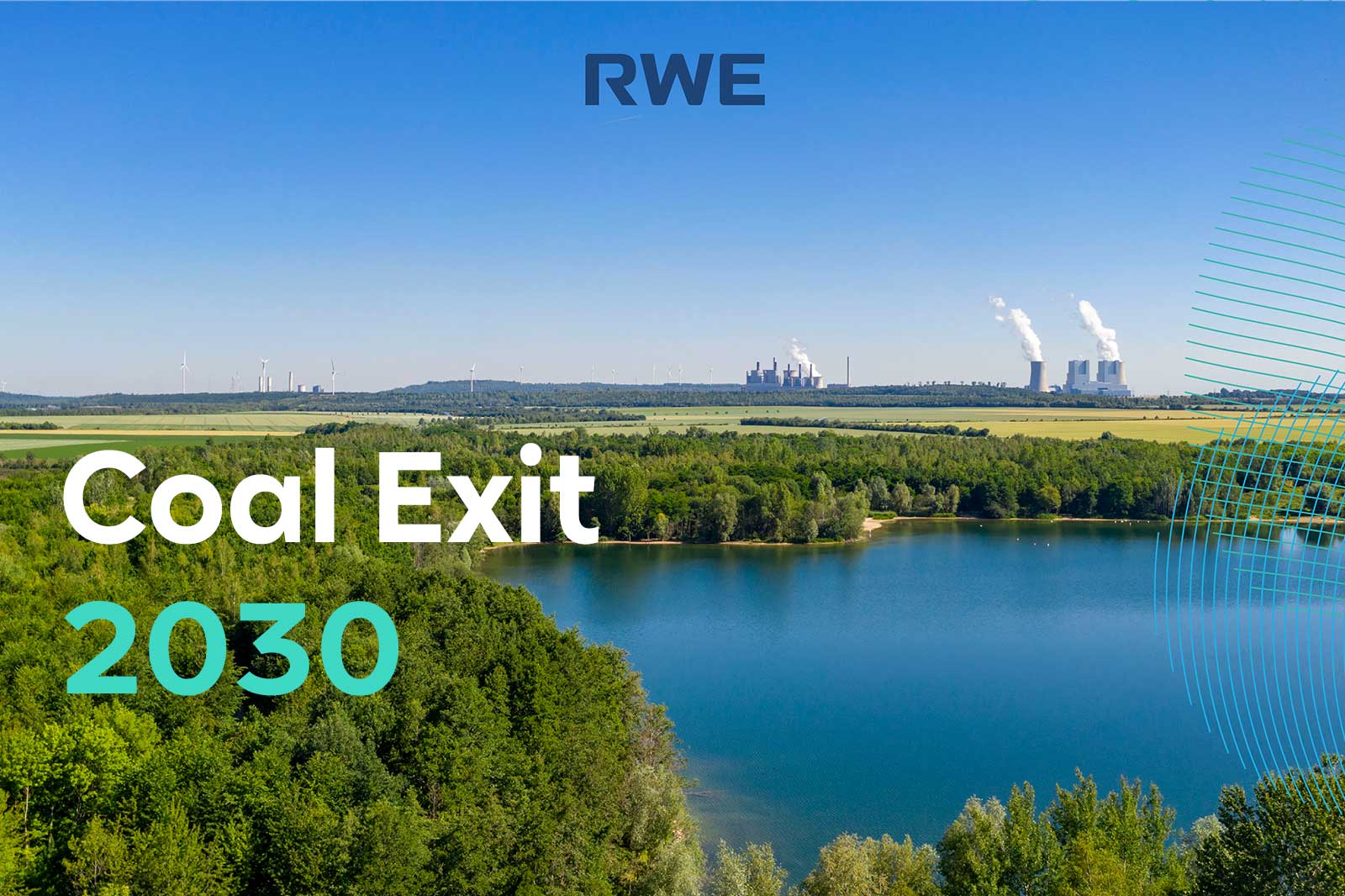RWE successfully issues its first inaugural US dollar green bond, marking a significant step into US debt financing
12.04.2024


RWE is ready to end lignite-based electricity generation in 2030. This decision is part of an agreement between the company and the Federal Ministry of Economics and Climate Protection and the Ministry of Economic Affairs, Industry, Climate Action and Energy of the State of North Rhine-Westphalia, which was presented today at a joint press conference in Berlin. The decision does not provide for any additional compensation for the company. At the same time, RWE confirmed its plans to invest massively in the energy transition.
Significant CO2 savings create basis for bringing company onto 1.5-degree path
The agreement to bring forward the lignite phase-out by eight years corresponds to a halving of the previously planned time span. This will leave around 280 million tonnes of coal in the ground corresponding to around 280 million tonnes of CO2 that will not be emitted. RWE is thus making a significant contribution to ensuring that Germany can achieve its climate protection targets. The company's long-term CO2 balance will thus once again improve considerably. Even before this decision, the company's strategy was in line with the Paris Climate Agreement. The 2030 coal phase-out is the basis for RWE to now be able to adjust its CO2 reduction plan to the 1.5 degree path.
Regulations on adjustment allowance for affected employees
For many employees at RWE, the early exit has a major impact. While more staff will be needed in the short term to operate additional power plants during the energy crisis, staff reductions will accelerate significantly towards the end of the decade. The company welcomes the fact that the German government intends to ensure that legal regulations allow for the use of the adjustment allowance. As in the past, RWE intends to implement the staff reduction process resulting from the accelerated decommissioning in a socially responsible way. The aim is also to give younger employees who cannot retire early an overview of the opportunities within the company or with other employers. Extensive qualification and retraining measures are to support the adjustment path.
High investment in renewable energies and secured capacity
In order for the coal phase-out to be possible, the energy transition must be so far advanced by 2030 that Germany's security of supply is not at risk. This requires a massive expansion of wind and solar power plants, storage facilities and additional secured capacity in the form of state-of-the-art gas-fired power plants that can be operated with hydrogen in the future. The German government intends to create a framework for the construction of these plants in order to facilitate the necessary investments.
RWE will play a major role in driving forward the expansion of these modern technologies. As one of the world's leading companies in renewable energies, the company will invest more than €50 billion gross globally in the expansion of its green core business by 2030, €15 billion of which is earmarked for Germany.
In North Rhine-Westphalia, the company is working to further increase its expansion target of 1 gigawatts (GW) of renewables. The Rhenish lignite area, with its former open-cast mining areas, is a focal point. RWE intends to participate in the necessary expansion of modern H2-ready gas-fired power plants with around 3 GW of power plant capacity. To this end, the company is earmarking former coal-fired power plant sites in NRW to strengthen the structural change of the region and secure industrial jobs.
Coal phase-out in 2030 helps achieve climate protection targets
By bringing forward the coal phase-out by eight years, North Rhine-Westphalia and RWE are once again taking a bold step forward and making an important contribution to achieving Germany's climate protection targets. In order to ensure security of supply during a short period of time after 2030, the German federal government can decide by 2026 at the latest whether the last lignite-fired power plants will be placed on security standby until the end of 2033. These include a 600-megawatt unit and the three modern lignite-fired power plants with optimised plant engineering, which have a total capacity of around 3,600 megawatts (MW). Should they be needed, no more changes are required to the opencast mine planning process. In addition, the recultivation that will start in 2030 will also continue unchanged.
Power stations temporarily remain online to help Germany in the energy crisis
In accordance with the German Coal Phaseout Act, the Neurath D and E power plant units are scheduled to be taken off the grid at the end of this year. Together, the two plants have a total capacity of 1,200 MW. In order to ensure that the available conventional power plant capacity in Germany is not further reduced, the decommissioning of the two units will be deferred until 31 March 2024 and, against the background of the current gas supply situation, remain on the market. Until the end of 2023, the German federal government will have the opportunity to extend the lifetimes or to transfer the units to a power plant reserve. Both options would be limited until 31 March 2025.
Implications of the coal phase-out for the Rhenish lignite mining area
By bringing forward the coal phase-out to 2030, the amount of coal produced at the Garzweiler open cast mine will be roughly halved, and the third resettlement planned at Garzweiler with the villages of Keyenberg, Kuckum, Oberwestrich, Unterwestrich and Berverath, including the three Holzweiler farms (Eggeratherhof, Roitzerhof, Weyerhof) will no longer go ahead. However, the coal under the former settlement of Lützerath, in the immediate run-up to the opencast mine, is needed to operate the lignite fleet at high capacity during the energy crisis and also to extract sufficient material for high-quality recultivation. The necessary permits and court decisions for this have been obtained and all of the original residents have already left the site.